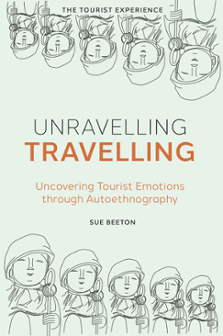
Index
Unravelling Travelling: Uncovering Tourist Emotions through Autoethnography
ISBN: 978-1-80117-180-9, eISBN: 978-1-80117-179-3
Publication date: 20 January 2022
Citation
Beeton, S. (2022), "Index", Unravelling Travelling: Uncovering Tourist Emotions through Autoethnography (The Tourist Experience), Emerald Publishing Limited, Leeds, pp. 223-226. https://doi.org/10.1108/978-1-80117-179-320211020
Publisher
:Emerald Publishing Limited
Copyright © 2022 Sue Beeton
INDEX
- Prelims
- Introduction
- Section One: The Theory
- Chapter One: From Experiences to Emotions
- Chapter Two: The Self as Data: Autoethnography
- Chapter Three: Autoethnography in Travel and Tourism
- Chapter Four: The Story So Far
- Section Two: The Stories
- Chapter Five: An Unlikely Pair?
- Chapter Six: My Stories
- Section Three: What Does It Mean?
- Chapter Seven: Analytical Autoethnographic Process
- Chapter Eight: Analytical Autoethnography Outcomes
- Chapter Nine: Evocative Autoethnography Outcomes – A Debate with Myself
- Section Four: Conclusion
- Chapter Ten: Assessing Autoethnography
- Chapter Eleven: So What?
- Afterword
- References
- Index